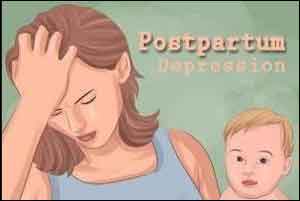- Home
- Editorial
- News
- Practice Guidelines
- Anesthesiology Guidelines
- Cancer Guidelines
- Cardiac Sciences Guidelines
- Critical Care Guidelines
- Dentistry Guidelines
- Dermatology Guidelines
- Diabetes and Endo Guidelines
- Diagnostics Guidelines
- ENT Guidelines
- Featured Practice Guidelines
- Gastroenterology Guidelines
- Geriatrics Guidelines
- Medicine Guidelines
- Nephrology Guidelines
- Neurosciences Guidelines
- Obs and Gynae Guidelines
- Ophthalmology Guidelines
- Orthopaedics Guidelines
- Paediatrics Guidelines
- Psychiatry Guidelines
- Pulmonology Guidelines
- Radiology Guidelines
- Surgery Guidelines
- Urology Guidelines
Postpartum depression risk, duration and recurrence

Postpartum affective disorder (AD), including postpartum depression (PPD), affects more than one in two hundred women with no history of prior psychiatric episodes, and raises the risk of later affective disorder for those women, according to a new study published in PLOS Medicine by Marie-Louise Rasmussen from Statens Serum Institut, Denmark, and colleagues.
PPD is estimated to affect more than 5 percent of all women following childbirth, making it the most common postnatal complication of childbearing. In the new study, researchers analyzed data from the Danish national registries on 457,317 women who had a first child (and subsequent births) between 1996 and 2013 and had no prior psychiatric hospital contacts or use of antidepressants. Postpartum AD was defined as an antidepressant prescription fill or hospital contact for depression within six months after birth.
In the Danish cohort, 0.6% of all childbirths among women with no history of psychiatric disease led to postpartum AD. A year after their first treatment, 27.9% of these women were still in treatment; after four years, that number was 5.4%. For women with a hospital contact for depression after a first birth, the risk of postpartum AD recurrence was 21%; the recurrence was 15% for women who took antidepressants after a first birth. These rates mean that, compared to women without history of AD, postpartum AD is 46 and 27 times higher in subsequent births for women with postpartum AD after their first birth.
"These population-based figures provide valuable guidance to physicians treating women with PPD," the authors say. "It underlines the seriousness of single initial episodes and highlights the necessity of both primary and secondary preventive measures of which several exist."
For more details click on the link : http://dx.doi.org/10.1371/journal.pmed.1002392

Disclaimer: This site is primarily intended for healthcare professionals. Any content/information on this website does not replace the advice of medical and/or health professionals and should not be construed as medical/diagnostic advice/endorsement or prescription. Use of this site is subject to our terms of use, privacy policy, advertisement policy. © 2020 Minerva Medical Treatment Pvt Ltd